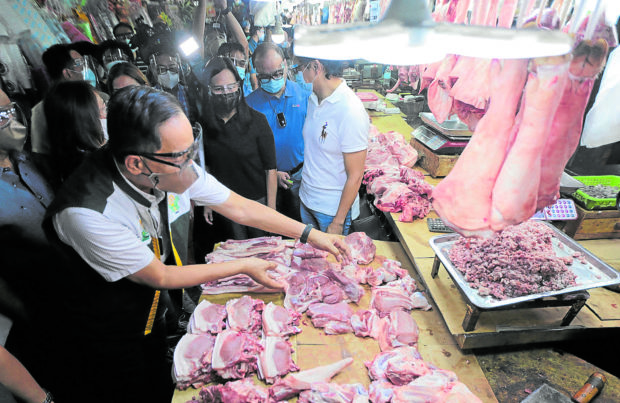
PRICE CHECK Agriculture Secretary William Dar leads a government team in monitoring prices of pork and chicken at Commonwealth Market in Quezon City in February 2021, the second day of the imposition of price ceilings on the food items. INQUIRER file photo / GRIG C. MONTEGRANDE
MANILA, Philippines — The Department of Agriculture (DA) assured the “calibrated arrival” of pork imports into the country as President Rodrigo Duterte’s executive order lowering tariffs on such product becomes effective.
Facing House lawmakers in a hearing Monday, Agriculture Secretary William Dar said Executive Order No. 128 is “now in effect.”
“The EO 128 is now in effect and that continues to be implemented by us. Whatever is needed in terms of import clearances being requested by importers, the Bureau of Animal Industry is now issuing said import clearances,” Dar said.
“We would like to assure that calibrated arrival of said imports will be properly managed and hoping that yes our ultimate goal is really that the imports will lower the prices of pork in the market,” he added.
It was on April 7, when the President signed the executive order, which temporarily lowers tariff rates on fresh, chilled, or frozen pork meat “to address the existing pork supply shortage, stabilize prices of pork meat, and minimize inflation rates.”
In addition to lowering pork import tariffs, the President also endorsed to Congress the DA recommendation to increase the minimum access volume (MAV) for pork imports by 350,000 metric tons (MT) on top of the current 54,210 MT.
Senators have already formally urged the President, through a resolution, to withdraw the said policies on pork importation, raising concerns that these could kill the local hog industry.
But Dar said that such measures are only temporary.
“This importation regime is temporary. This only will be effective for a year. It is an immediate and temporary response to the deleterious impact of the surging prices of pork and other commodities,” the DA chief said during the House hearing.
In a previous Senate hearing, National Economic and Development Authority (NEDA) Acting Secretary Karl Kendrick Chua said the temporary increase in pork imports “will not kill the local hog industry.”
“Also, as mentioned by some experts, imports will not flood our markets since ASF (African swine fever) has also affected the production of many countries,” Chua earlier told senators.
He said the country’s limited cold chain facility will serve as a “physical barrier” to huge importation since the total capacity is only estimated at around 268,000 MT for pork “given the requirements of other commodities.”
“Hence, we think the 404,000 plus MT proposed for importation will only gradually enter the country as needed instead of being imported at the same time contrary to industry concerns,” Chua added.

